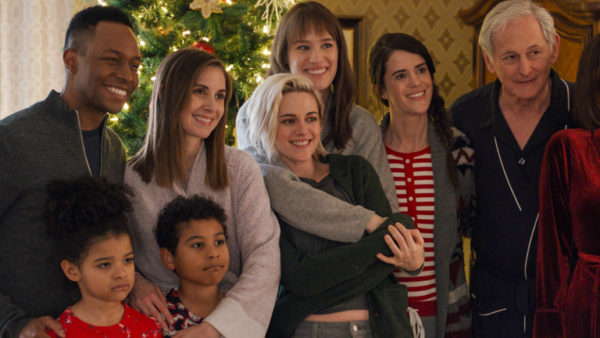
With the release of Clea DuVall’s queer holiday film, Terry Mesnard and I are offering spoiler-free and spoilery reviews.
Plot: Meeting your girlfriend’s family for the first time can be tough. Planning to propose at her family’s annual Christmas dinner — until you realize that they don’t even know she’s gay — is even harder. When Abby (Kristen Stewart) learns that Harper (Mackenzie Davis) has kept their relationship a secret from her family, she begins to question the girlfriend she thought she knew.
SPOILER-FREE REVIEW
JOE
Happy holidays, Terry! It’s fun to come out of hibernation so that we can co-review a lesbian holiday film, directed by none other than queer icon Clea DuVall no less. And while, yes, it is a shame that Happiest Season was waylaid from a theatrical run due to the ongoing pandemic, it’s great to see Hulu snap it up so that folks can enjoy the film this year.
Overall, it’s tempting to say that the greater ease of accessibility by the public will ultimately help the film to find a larger audience than if it had been released in another year. On the other hand, for queer audiences, this is a disappointing development in that it prevents us from voting with our wallets for an original queer text.
Either way, the question remains: is the film any good? My answer is a trepidatious yes, though it’s not quite the slam dunk I was hoping for.
Happiest Season is about couple Harper and Abby. In the first scenes it’s quickly established that the former is upbeat and loves the holidays; the latter, who lost her parents at 19, isn’t quite as sold on the holidays. Harper attempts to rectify this by impulsively inviting her girlfriend to accompany her home for the holidays, and then – en route – drops the bombshell that she never told them about Abby…or that she’s gay.
This is a pretty conventional rom-com (or even Hallmark holiday film) set-up. The premise is rife with any number of possible comedy of errors en route to the inevitable third act misunderstanding, followed by a satisfactory ending. And yet DuVall has crafted much more of a conventional drama than a romance, and while there are certainly comedic beats and characters, this is a far more serious endeavour than it initially seems.
While I’m glad to see such a queer positive text, replete with any number of esteemed allies (Mary Steenburgen! Allison Brie! ) and queer actors (Stewart is joined by Victor Garber, Aubrey Plaza and Dan Levy), I was frustrated that this queer holiday film is mostly a coming out story about homophobia that was often short on love, tenderness and romance. I won’t lie: I found the ending extremely unpleasant and unsatisfying, despite the fact that it’s clearly intended to be warm and heartfelt.
But that’s enough for now without going into the details, so I’ll turn it over to you for some spoiler-free thoughts, Terry. What are your overall thoughts on the film?
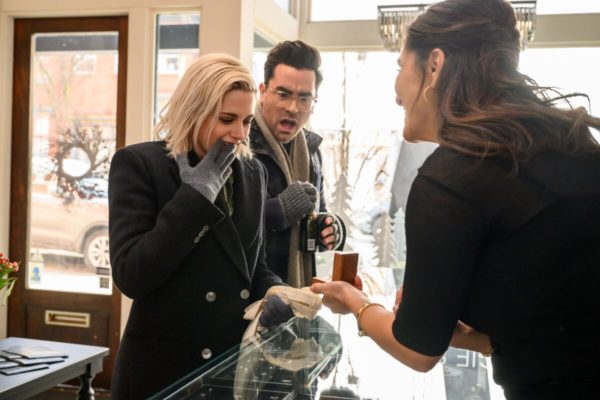
TERRY
Happy holidays to you, as well, Joe! We’re kind of in the doldrums of horror releases so I’m really happy to have something queer to dig into with you. It’s funny because I don’t like Christmas movies (or music for that matter…) and romantic comedies are typically not my thing, either. So even though we were getting a queer Christmas movie with amazing talent in front of and behind the camera, I still approached it with a lot of trepidation. I have to admit, though, that seeing the screenshots from the production and hearing more about it kind of warmed my heart.
“Is this what representation feels like?” I asked myself.
Like you suggested above, the results are mixed, though mostly positive. Happiest Season feels very traditional in the set-up…I don’t watch a lot of Christmas movies and even I could see the bones of a Hallmark movie. I think the fact that we have Stewart and Davis as the two leads, followed by an all star cast of supporting characters helps elevate the film. In particular, I loved Aubrey Plaza’s character and the wrinkles she adds to the film…which I’m sure we’ll dig into in the spoiler section.
What surprised me the most was that while the film is presented as an almost madcap romantic comedy of errors…it’s actually not. The opening certainly establishes it, with Harper and Abby ditching a Christmas lights tour to climb onto the roof of the one house that’s not garishly lit…and then Abby proceeds to fall off the roof and runs into the sexually roleplaying couple inside. It sets up the film as a silly comedic romp, but once the two lovers arrive at Harper’s parent’s house, the film became really uncomfortable for me.
As you mentioned, the central conceit is that Harper’s family doesn’t know she’s gay and so Abby is passed off as the orphaned friend who didn’t have a place to go for Christmas. So for most of the middle section, we follow Abby and Harper trying to sneak around behind the family’s back while trying to find some secret alone time. It made me deeply uncomfortable…mostly because I was someone dating a person when my family didn’t know I was gay and this conversation came up repeatedly during the short experience. So I didn’t find the lengths they went through to secretly meet up funny or entertaining. It really just made me kind of sad and antsy.
On the whole I did enjoy Happiest Season a whole lot more than I honestly expected and while, yes, the ending felt a bit flat…I did find myself feeling a bit emotional about it. Maybe it’s the year we’ve just experienced or maybe it’s just that I needed a little bit of saccharine Christmas magic, but I ultimately found myself smiling by the end.
So, Joe…let’s dig in more deeply. What did you think of Harper’s family members, from the sweetly manic Jane (Mary Holland) to the eldest daughter Sloane (Brie)? And did you like the addition of Riley (Plaza), Harper’s secret ex-girlfriend who provides some interesting complications as the drama unfolds?
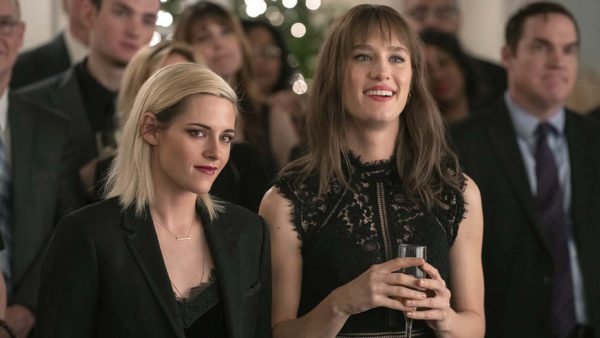
SPOILERS AHEAD – DON’T READ FURTHER IF YOU HAVEN’T SEEN THE FILM
JOE
Alright, now we can get candid!
So, much like you Terry, I had some pretty significant personal reactions to this film and I’m curious to see how the queer community will react to some of the film’s developments, in particular some of the big climactic stuff.
I’ll tackle your question about the characters because this cast is stacked. The appealing nature of many of these actors really helps to make some of the film’s tricky, familiar and/or unpleasant narrative beats land a little more softly. So while Harper’s parents are low-key despicable to their daughters and Abby, because they’re played by Steenburgen and Garber, they’re hard to dislike.
The same goes for Sloane, who in any other narrative would simply be a hissable caricature bitch older sister. But Brie plays Sloane to uppity WASP perfection, including a full face of make-up and immaculately perfect hair, that she’s damn near impossible to hate. If nothing else I would have liked more time with all of these characters, as too much time is dedicated to sneaking around, which felt far too familiar to me.
I think most viewers will gravitate to Holland as the film’s break-out star. Jane is adorably awkward, at times resembling a glorified SNL character, but Holland maximizes every moment of screen time she has to make the beleaguered younger sister shine. It’s a very offbeat, zany performance, but there’s also a huge amount of pathos embedded in the character. I loved the moment in the climax when Jane bemoans the 1000 hours she spent working on the painting her older sisters don’t hesitate to ruin.
Which leads me to my big complaints about the film: the ending.
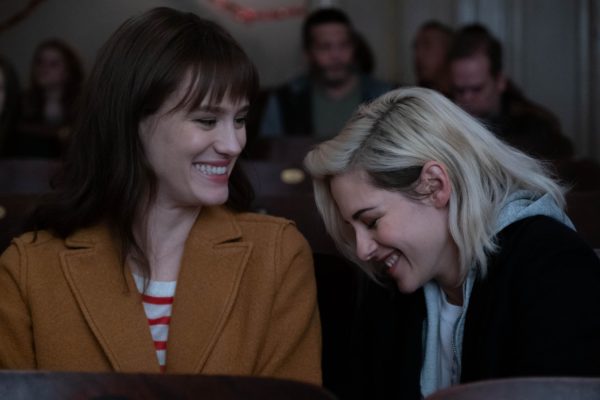
Now I’ve been accused of being a Scrooge and the longer that the pandemic goes on, the more emotionally broken I am inside, but this ending didn’t work for me at all.
Happiest Season’s greatest fault is that it wants us to root for a queer romance where none exists. Yes, obviously the film’s whole intent is to shed light on why Harper is emotionally closed off (ie: her family/upbringing) and how it prevents her from being her true authentic self.
I get that, but at its core, the film isn’t as much about Harper as it is about Abby: she is our main protagonist and the film’s dominant perspective (it is told through her lens). And while I know how difficult it can be to find yourself closeted during the holidays – an already stressful time for families, never mind queer folks – roughly ⅔ of the film is Harper being cruel to Abby, pushing her away and blaming her. If this were more of a light-hearted comedy, some of this would land better, but there are surprisingly few laughs and the few that are clearly meant to be comedic, like Harper and Sloane’s physical brawl during the White Elephant party, suffer from DuVall’s inexperience with framing and direction because the comedy doesn’t quite land.
The result is that we side with Abby as the aggrieved party, even as we understand Harper’s uncomfortable position. It’s also a problem that Stewart and Plaza have really good chemistry, so as the film progresses and Abby and Harper spend less time together, it becomes easier to envision an outcome where Abby and Riley become a couple.
And then comes that kicker of a finale which fully lost me in two (!) places: when Sloane outs Harper and when the couple quickly and easily reconciles in order to have a happy ending.
The former is a small grievance, but one that greatly irked me. While it can be frustrating to have to continually come out as queer throughout our lives, the decision is ultimately a personal – and often symbolic – one. It’s why Abby’s discussion with John outside the house about being “out” is so impactful.
Sloane’s outing of Harper is traumatic on two fronts because Harper 1) isn’t ready to come out to her family and 2) she doesn’t do it herself. Obviously this is a meaty conflict for the film, but then it is undercut when Sloane immediately follows Harper’s queer confirmation with the announcement of her divorce from Eric. This makes sense for Sloane’s character and at this point the daughters are confronting their parents as a unified front, but it really frustrated me that Harper’s big moment is stolen by Sloane TWICE. The fact that the film never addresses the gravity of Sloane’s actions and what she effectively took away from her sister is really bothersome. It’s challenging to understand why Harper would forgive her.
This leads into the latter (larger) complaint: this ending is far too condensed. All of the problems are laid out and solved far too quickly so that we can get the fairytale ending one year later. Obviously, yes, this is a romance – and a seasonal one at that – but this result doesn’t satisfy. I’m sorry, but after the way Harper treats Abby and Abby’s proclamation that she wants someone who “is ready” to be in a relationship, it’s unbelievable that they reconcile here after just a few minutes.
Call me a holiday Scrooge, but Harper doesn’t deserve Abby and this reunion feels disingenuous. I would have rather that they broke-up, met one year later on the street and decided to give things a go now that Harper has 1) had an opportunity to live as an out woman, but, more importantly, 2) reflect on how important Abby is to her. As it is, we’ve spent most of the film seeing why they don’t work as a couple, so the 180 to a literal picture perfect ending didn’t feel earned to me.
Apologies, Terry, for dropping this loaded proclamation in your lap. How did you feel about Happiest Season’s end: am I off base or do queer audiences deserve this happy, albeit unbelievable, ending? What did you think of DuVall’s writing & direction? And would you have rather seen Abby and Riley get together? Perhaps we can hope for a Riley spin-off where that gorgeous lesbian escapes her mother’s clutches, moves to the big city and meets a wonderful new woman!
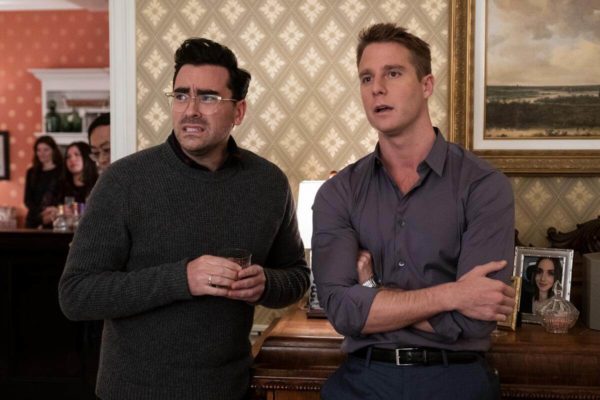
TERRY
Joe, you are absolutely right: Harper does not deserve Abby. In fact, to dig into your question, I absolutely wanted Riley and Abby to get together.
Happiest Season has the weirdest sense of pacing as it starts as a comedy of errors and then gets incredibly serious for the middle part only to try and come back together as a romantic comedy. The problem is that the middle section is so dramatic that when the comedic antics occur (like Sloane’s kids hiding a necklace in Abby’s backpack), they just don’t work. Instead, I found the relationship between Abby and Riley to be the most fascinating and intriguing aspect of the narrative.
Sure, Riley immediately understands what Abby is going through since she went through the same secretive relationship. But there’s more to it. Riley seems more mature and comfortable in her own skin than Harper. In this regard, she and Abby are on the same page and on the same journey through life. Harper’s trailing in the distance and, in real life, she and Abby would be passing ships in the night.
You mentioned that this is a romance where none exists and that was my initial problem with the narrative. Outside of the cutesy opening, Harper and Abby’s relationship is never really established. So by the time Harper is falling back into old habits by hanging out with her ex boyfriend (Jake McDorman), staying out late and discounting Abby’s feelings and, let’s be frank, her actual existence, I was ready for Abby to eject from this horrible family.

When Riley pops in and commiserates with Abby, it’s the first time we see anyone treating her like an actual person. I do not understand how Abby would want to be with Harper after this is all over because Harper absolutely showed her selfish, true colors here.
It’s tricky, though. Like I mentioned above, I did find myself in a potential situation like this once where I was the Harper. It never went to these extremes, but it consumed my every thought for a few months. Being closeted is a very complex and nuanced discussion and because we only see the film from Abby’s perspective, it’s difficult to see the emotional turmoil (if any) that Harper is going through. In the third act, Dan Levy’s John delivers a “Talking To” to Abby to remind her (and the audience) that we don’t know what Harper’s going through, but it’s shorthand for a much more complicated discussion that the film isn’t interested in having.
As you said, by the time we’ve hit the third act there’s too much to resolve that everything gets sort of hand-waved away through brief snippets of dialogue.
It’s interesting that you mention a spinoff where Riley manages to escape her mom’s clutches because in the Instagram posts over the credits we actually do get to see Riley with a woman…none other than Clea Duvall herself! Another shorthand way of waving away any sad endings. Everyone’s happy and the bigoted parents are now practically members of PFLAG!
I feel like we’ve both been very down on Happiest Season and yet I have to say that I did enjoy this film overall. I’m not a fan of Christmas movies nor romantic comedies and yet this one did click for me…despite the negatives we’ve outlined above. I also really appreciated having a Christmas track from Tegan and Sara! As a sophomore directorial feature from Duvall I think the direction is fine. I think the biggest issue comes from the script which was written by both Duvall and Mary Holland. I wonder if their two sensibilities were at odds and that’s why the pacing and the mix of drama and humor doesn’t really gel.
Overall, even with my many problems with the script and the way the story uses a coming out story as a springboard for wacky situations, I still mostly enjoyed Happiest Season. I definitely want more queer stories where coming out is not the raison d’être for the script, but seeing a queer story with queer people in front and behind the camera warmed my heart.
It’s not perfect but I’ll give Happiest Season a B-.
What about you, Joe? What are your final thoughts on this queer Christmas story?
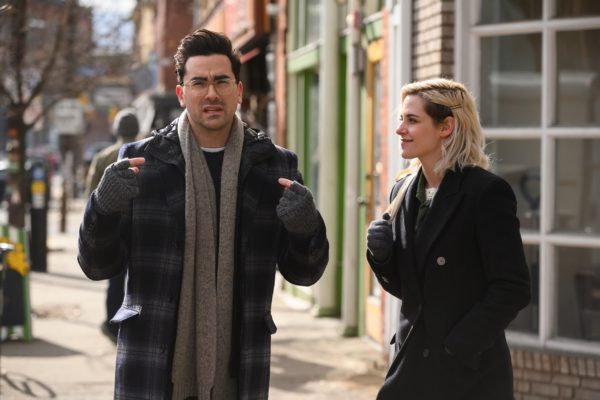
JOE
Yeah, we’re very much in synch here, Terry. I continually referred to myself as Scrooge throughout this piece if only because I do think we’re in the minority and this very queer-centric tale is resonating with other folks. And you know what? That’s fucking great – because if Happiest Season brings joy to people, especially queer audiences, during troubled times and going into a fraught holiday season, then that’s worth celebrating.
Despite all of my complaints, I actually did enjoy the film a fair amount. I wanted different narrative choices and the fact that Abby seemingly settled at the end was frustrating, but the reason it bothered me is because I became really emotionally invested in Abby (shout-out to Stewart, who continues to not get a fair shake by audiences, much to my chagrin). So yeah, I wanted a different outcome, but I still liked the movie.
It’s a B- for me, as well.
To read more of Terry’s work, visit his site Gayly Dreadful
I thoroughly enjoyed it for what it was and went into trying not to over analyze it. I agree with most of your quibbles but fully enjoyed it despite. I also am not a Christmas movie fan nor romantic comedy mainly because I find the formula boring and “too hetero norm”. So the fact I like this film despite the fact it follow that playbook says something. Also watched Uncle Frank which I loved